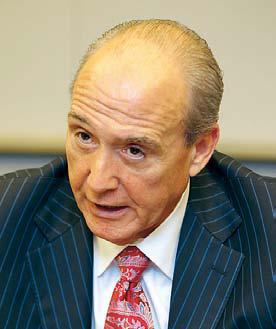Backed up by its increasing national wealth and population, Korean investors could become major customers in the U.S. retail real estate market, a U.S. expert said in Seoul on Thursday.
“Korea is in a great position with its wealth and population … and needs to invest overseas to diversify.” Joseph F. Coradino, president of Pennsylvania Real Estate Investment Trust, told The Korea Herald.
The U.S. market will likely continue to rise, as shown by the history of market change after recessions, Coradino said. The rapidly growing U.S. retail real estate market is driving retail investment companies to turn their eyes to Korean investors, as stable long-term investment, the PREIT chief added.
Coradino came to Korea to take part in an informative session on the U.S. retail real estate investment to be hosted by Cushman and Wakefield Korea, a U.S. real estate solution company, in Seoul on Friday.
With Korean funding and pension companies surging in investment capital, U.S.-based real estate investment trust companies are prepared to attract Korean investors by offering invitational trips and investment consulting sessions.
According to a report released by Cushman and Wakefield Korea, offshore real estate investment started bouncing back in 2009. Major pension companies began purchasing a massive amount of stocks for landmark edifices and shopping malls in the U.S. and the U.K.
 |
PREIT president Joseph F. Coradino |
“I would say 2012 is the ideal time to invest (in U.S. retail real estate),” said Coradino. The real estate market has hit the low level in 2009 but has been rising since then.
The NYSE-listed company added that the real estate market has been demonstrating rapid growth, equal to approximately 4.3 percent per year. The U.S. real estate market dropped dramatically during the recession until 2009 then bounced back, PREIT said, citing a recent index provided by the MIT Center for Real Estate.
Edward A. Glickman, chief operating officer of PREIT said that the U.S. real estate market is a better choice than other foreign real estate markets for three reasons: the relative stability of the U.S. government, transparency of the market and fastest growth among developed countries.
Glickman pointed out that liquidity is one of the most crucial criteria in investment, especially for foreign investors. “Our market is so mature and large that significant transactions provide a lot of liquidity.”
Among various shopping mall estates, PREIT recommended that Korean pension and funding organizations make a medium and long-term investment in U.S. high-end prime shopping malls.
With “trophy tenants” like The Capital Grill, True Religion, Boss, Guess and Swarovski, prime shopping malls will yield relatively stable assets, Coradino and Glickman said. Prime shopping malls are also an aggregate of pioneer tenants, who tend to stay in the same shopping mall for a long time. Prime shopping malls contribute to forming great relationships between retail real estate investors, Coradino said.
About risks that Korean investors can face in foreign real estate market, Coradino said that this is why they should keep themselves informed through a good real estate trust consulting company.
The National Pension Service has confronted criticisms over its purchase of famous foreign estates, concerning whether or not a public entity should make risky overseas investments with public funds. Such investments are not unreasonable, Coradino said.
“The NPS is doing nothing different than what is being done in other countries. (It is) standard procedure for operating major pensions and funds. These organizations invest about 5 to 10 percent of their funds to alternative investment, which is growing all over the globe,” said the PREIT president.
By Chung Joo-won (
joowonc@heraldcorp.com)





![[Exclusive] Hyundai Mobis eyes closer ties with BYD](http://res.heraldm.com/phpwas/restmb_idxmake.php?idx=644&simg=/content/image/2024/11/25/20241125050044_0.jpg)
![[Herald Review] 'Gangnam B-Side' combines social realism with masterful suspense, performance](http://res.heraldm.com/phpwas/restmb_idxmake.php?idx=644&simg=/content/image/2024/11/25/20241125050072_0.jpg)

